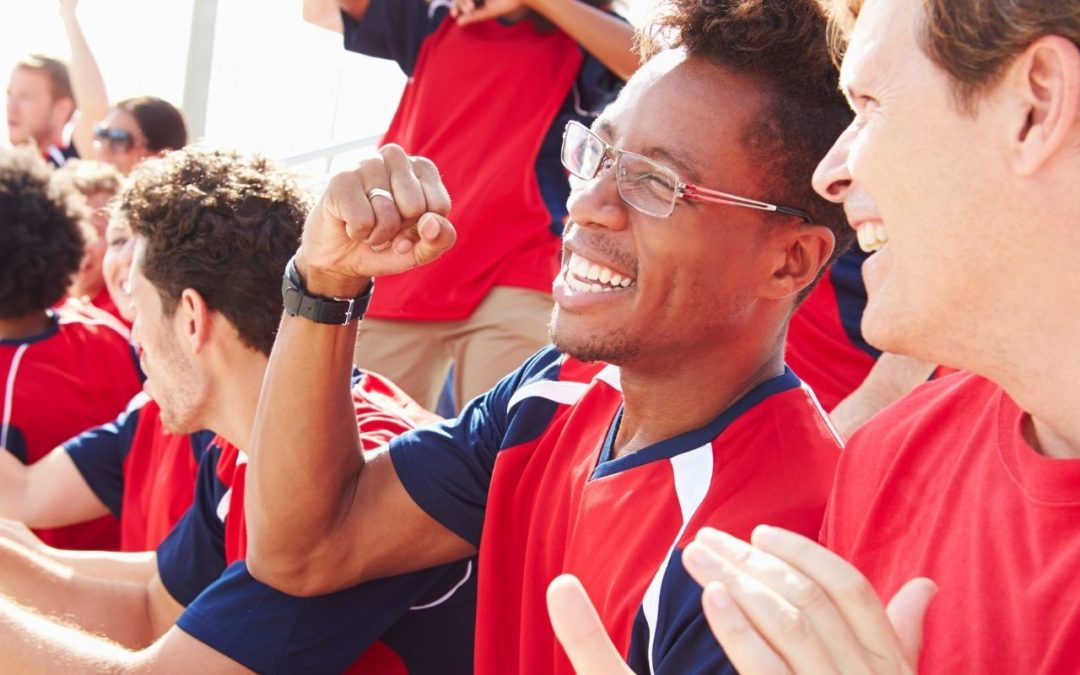There are more opportunities to attend sporting events as more things continue to open up during the pandemic. While this is exciting and many look forward to cheering on their favorite teams or spending time with loved ones at a game, sporting events can be tough on hearing health. The noise levels produced during games and in larger venues can be hazardous for hearing health. Exposure to exceedingly high levels of noise can damage hearing, contributing to hearing loss. This highlights the importance of protecting your hearing health and actively practicing these safety measures so you can fully enjoy attending a game without compromising your hearing.
Sporting Events & Loud Noise
Knowing about noise levels and where sporting events are on the spectrum illuminates the importance of protecting your ears. Sound is measured in units referred to as decibels (dB) and noise above 85dB can be dangerous for one’s hearing. If you are wondering how loud this is, it is the equivalent of busy city traffic or a hairdryer – so likely not as loud as you were expecting. Experts suggest that people can be exposed to noise at 85dB for 8 hours a day without damaging their hearing. But if you are exposed to sound above 85dB, exposure time needs to be significantly reduced. The Occupational Health and Safety Administration (OHSA) recommends reducing exposure by half for every 3-decibel increase of noise after 85dB:
- 85dB: 8 hours
- 88dB: 4 hours
- 91dB: 2 hours
- 94dB: 30min
Noise levels at an average football game range between 80 to 90 decibels and at peak times, volume can reach 108dB. An interesting fact is that the record for the loudest crowd in history was 137.6 decibels. When noise levels reach 100dB, the safe exposure time is only 7 minutes. Exceeding this can damage hearing which is why it is incredibly important to implement safety measures.
Understanding Noise-Induced Hearing Loss
One-time or consistent exposure to loud noise is one of the most common causes of hearing loss. The World Health Organization estimates that over 1 billion people globally are vulnerable to developing hearing loss due to loud noise exposure from sources including public/social venues. Loud noise can damage the hair cells in the inner ear. These sensory cells play a major role in how we process sound. They convert incoming soundwaves into electrical signals that the auditory nerve carries to the brain. The brain is then able to process and assign meaning to these signals which is how we can understand what we hear.
Loud noise can cause these cells to become desensitized and/or die, preventing them from performing their critical function. This results in the brain receiving less auditory input which produces hearing challenges. Unlike other types of cells we have, hair cells in the inner ear do not regenerate. This means that when they experience damage, the effects are permanent, causing chronic hearing loss.
Tips to Protect Your Ears
Noise-induced hearing loss is 100% preventable and there are simple ways you can protect your hearing. A few safety measures include:
- Wear hearing protection. One of the most effective ways you can protect your hearing from loud noise is by wearing hearing protection. This is especially important during sporting events where noise levels can be excessive. Hearing protection includes earbuds, headphones, earmuffs, etc. which offer a protective barrier for the ears. This reduces the amount of loud noise you absorb and its impact. Venues typically sell earbuds or earplugs so be sure to grab a pair and keep them handy for when it starts getting loud.
- Take listening breaks: While attending sporting events be sure to take breaks from all the noise and activity. This will provide your ears and brain with time to recuperate from absorption and processing so much noise. You can do this by going to the bathroom, getting snacks, or just moving to a quieter area for a few minutes.
- Reduce loud noise exposure: it is also useful to reduce your exposure to loud noise in your daily life. You can do this by maintaining lower volume settings on electronic devices, avoiding noisier settings like restaurants during peak hours, and even investing in noise-canceling headphones which reduce background noise.
Another useful way to protect your hearing is to have your hearing tested regularly. Hearing tests are a great way to track your hearing health and any changes you may experience. Contact us today to learn more.


